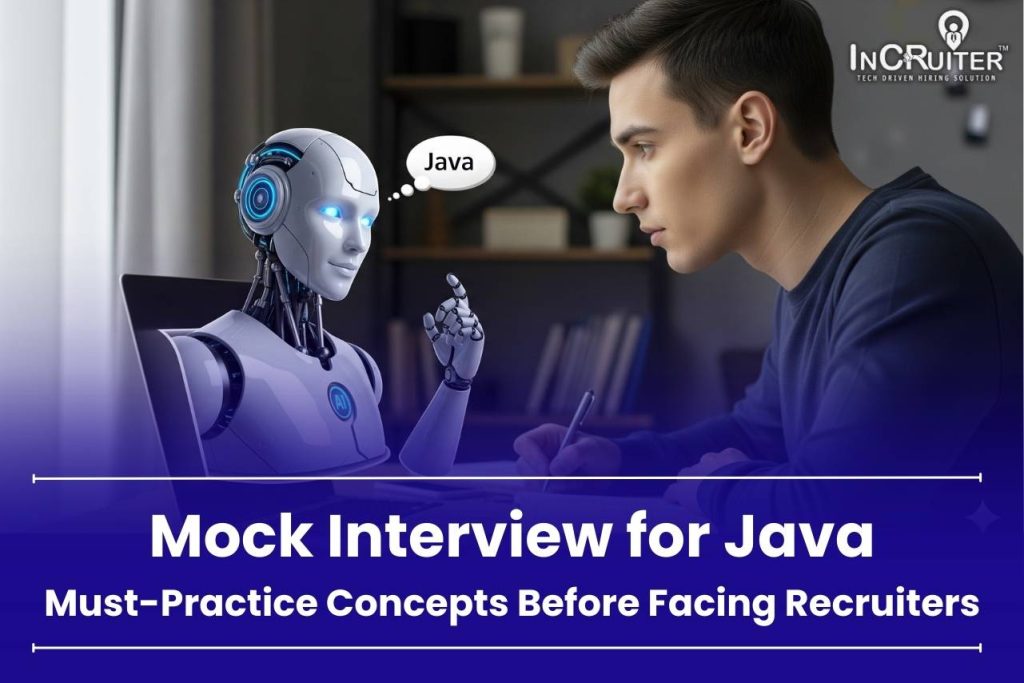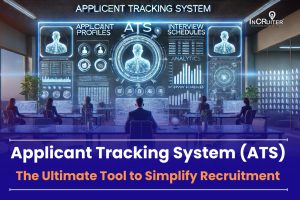
For many developers, the phrase “Java interview” sparks a mix of excitement and anxiety. Java remains one of the most in-demand programming languages in the job market, powering everything from enterprise applications and backend services to Android apps and cloud-native systems. With thousands of developers competing for the same opportunities, standing out in a Java interview has never been tougher.
The stakes are high. Recruiters and hiring managers don’t just want to know if you can write a HelloWorld program or explain what polymorphism means. They want to see if you can think like a problem-solver, design like an engineer, and communicate like a collaborator.
And here lies the catch: most candidates fail not because they lack knowledge, but because they cannot apply concepts under interview pressure. They hesitate, stumble through coding challenges, or give vague explanations. The result? Missed opportunities.
That’s why AI mock interviews are essential. A mock interview simulates the pressure, structure, and unpredictability of a real interview. It gives you the chance to rehearse, make mistakes, and learn in a safe space. By practicing with mock interview platforms or, even better, with experienced interviewers, you build the fluency, confidence, and resilience recruiters are searching for.
This blog is your step-by-step preparation manual. It covers:
- What recruiters actually test in Java interviews.
- The core, advanced, and modern Java concepts you must practice.
- The typical interview format and how to rehearse it.
- Tips to maximize value from mock interviews.
- A final Java-specific readiness checklist before facing recruiters.
Let’s dive in.
What Recruiters Actually Test in Java Interviews?
When candidates prepare for Java interviews, many focus on memorizing definitions, syntax rules, or trivia questions. But recruiters aren’t gatekeepers of textbooks; they are evaluators of problem-solvers.
Here’s what most Java interviews are really designed to test:
- Application of Core Principles: Can you take concepts like OOP or collections and apply them to solve real-world problems?
- Problem-Solving Ability: Do you approach coding challenges with logic, structure, and efficiency? Or do you hack your way through?
- Code Quality & Maintainability: Is your code clean, modular, and readable? Can another engineer maintain it six months from now?
- System Thinking: Beyond code snippets, can you design solutions that scale, handle concurrency, and integrate into larger architectures?
- Ecosystem Awareness: Do you understand memory management, APIs, frameworks, and modern Java features relevant to today’s tech stack?
- Communication: Can you explain your design choices clearly? Recruiters need to know not just what you did but why you did it.
In short, recruiters don’t want someone who can just “write Java.” They want someone who can engineer with Java.
Also Read: Java Common Interview Questions
Java Concepts You Must Practice in Your Mock Interviews
Recruiter-led technical interviews are designed with precision. They are less about testing if a candidate “knows Java” and more about identifying whether the individual can translate Java expertise into business-ready engineering outcomes.
The focus areas vary by role level, but the expectation is consistent: demonstrable competence under structured assessment.
A. Must-Know (Core Evaluation Areas in Every Java Role)
OOP Principles
Organizations rely on object-oriented design to scale systems without chaos. Candidates are therefore assessed on how effectively they apply abstraction, encapsulation, inheritance, and polymorphism in constructing logical, reusable models.
Mock interview practice ensures they can present class hierarchies and interactions as real-world design solutions rather than academic exercises.
Collections Framework
Every enterprise application depends on efficient data handling. Recruiters look beyond syntax to evaluate whether candidates can select the right collection type for specific business contexts, optimizing for speed, memory, or uniqueness.
Mock interviews reveal practical reasoning: why a HashMap fits high-volume lookups or a Set guarantees integrity.
Exception Handling
Resilient software underpins business continuity. Recruiters expect candidates to articulate structured exception-handling approaches that balance system stability with user experience.
Practicing this in mock sessions equips candidates to explain layered handling strategies, ensuring failures don’t cascade into outages and demonstrating readiness for production-grade engineering environments.
Basic Coding Challenges (DSA)
Short algorithmic tasks validate clarity of thought under constraints. Recruiters are not looking for research-level complexity but for disciplined approaches to common structures like arrays, strings, or recursion.
Mock interviews allow candidates to prove they can solve problems quickly, communicate logic, and maintain code readability all within minutes.
B. Frequently Asked (Backend & Mid-Level Role Requirements)
Multithreading & Concurrency
Backend services live or die by concurrency management. Recruiters routinely assess how candidates handle synchronization, parallel execution, and throughput optimization.
Mock interviews expose whether an engineer can translate theoretical knowledge into thread-safe implementations, balancing efficiency with reliability in a way that directly impacts customer-facing performance.
Design Patterns
Patterns remain a proxy for architectural discipline. Recruiters expect candidates to rationalize their design choices, why a Singleton secures state, or why a Strategy pattern enables extensibility.
Practicing these discussions in mock sessions prepares candidates to explain decision-making with the clarity expected in collaborative product engineering environments.
Memory Management
Even with garbage collection, memory mismanagement still disrupts enterprise systems. Recruiters test for awareness of heap behavior, reference lifecycles, and diagnostic practices.
Mock interviews allow candidates to rehearse how they would identify leaks or optimize the footprint, presenting themselves as engineers capable of safeguarding system efficiency at scale.
Java 8+ Features
Modern enterprise codebases demand fluency in Java 8 features. Recruiters assess whether candidates can leverage Streams, lambdas, and Optionals to produce concise, maintainable code.
Mock sessions ensure candidates can frame these not as stylistic flourishes but as mechanisms for reducing technical debt and accelerating delivery cycles.
C. Modern & Advanced (Senior & Forward-Looking Teams)
Java 17+ Features
Evolving Java standards are increasingly central to senior hiring. Features such as Records, sealed classes, and switch pattern matching simplify complexity and enforce safer designs.
Mock interviews confirm whether candidates can contextualize these innovations as enablers of productivity and long-term maintainability in enterprise ecosystems.
Java 21 (LTS)
Virtual Threads and Structured Concurrency have reshaped concurrency management. Recruiters expect senior candidates to discuss these innovations in terms of business scalability, reducing operational overhead while supporting massive workloads.
Practicing these conversations equips candidates to present modern concurrency strategies in a manner aligned with enterprise performance objectives.
Java 23/24 Preview Features
Forward-looking companies value engineers who track the future of Java. Awareness of String Templates and Scoped Values signals adaptability and thought leadership.
Mock interviews create a safe setting for candidates to demonstrate awareness without overstating implementation maturity, positioning them as professionals who stay ahead of the curve.
System Design & Scenario Questions
At senior levels, recruiters push beyond code into system architecture. Candidates may be asked to outline solutions for high-throughput or mission-critical environments.
Mock interviews enable them to practice framing design trade-offs, scalability choices, and Java’s role in distributed systems, aligning technical reasoning with organizational impact.
Also read: AI mock Interview
Mock Interview Format to Simulate Before the Real Thing
Recruiter-led interviews are never random. They follow a deliberate structure that measures different competencies within a fixed time frame. For preparation to be effective, mock interviews must replicate this rhythm exactly.
When candidates practice in the same format, they build fluency, reduce surprises, and demonstrate the consistency recruiters rely on.
15 Minutes – Intro & Background Discussion
The first segment functions as a calibration exercise. Recruiters gauge communication skills, confidence, and role alignment before diving deeper.
Mock practice ensures candidates can present career narratives concisely, link past projects to business needs, and project professionalism, key signals recruiters use to decide whether to proceed with further technical assessment.
30 Minutes – Coding & Core Concepts
This is the decisive segment where recruiters validate problem-solving ability. They test fundamentals, algorithms, and practical coding under constraints. Success is measured as much by reasoning clarity as by code accuracy.
Structured mock interviews help candidates rehearse logical articulation and efficient coding habits, making their technical competence transparent in evaluation.
15 Minutes – System Design & Scenarios
In the final stage, recruiters assess architectural maturity. Candidates are asked to design scalable systems, handle constraints, and explain trade-offs.
Mock simulations allow them to practice framing solutions in business-relevant terms, demonstrating not only Java expertise but also readiness to contribute to enterprise-level design discussions and long-term product stability.
Platforms like InCruiter replicate this exact structure. You practice in real-time with expert interviewers who provide targeted feedback on both technical depth and communication.
Also Read: mock interviews online for enhancing your interviewing skills
Tips to Maximize Value From Mock Interviews
Mock interviews deliver meaningful results only when they replicate the rigor of recruiter assessments. To transform them from casual practice sessions into measurable readiness exercises, candidates must approach them with structure, discipline, and role alignment.
The following practices ensure preparation translates directly into recruiter confidence.
Take It Seriously
Recruiters immediately recognize candidates who prepare professionally. Treating a mock interview like a live session, dressing appropriately, setting up a distraction-free environment, and engaging with focus builds behavioral consistency.
Advanced AI mock platforms further analyze body language and tone, giving candidates actionable insight into the impressions they create during real assessments.
Review Feedback Thoroughly
Surface-level metrics rarely tell the full story. Recruiters assess not just outcomes but also efficiency, accuracy, and communication clarity. Reviewing detailed feedback reports from mock interviews allows candidates to identify systemic weaknesses, whether in coding speed, logical explanation, or delivery style, helping them refine precisely what recruiters prioritize in evaluations.
Practice Variety
Recruiter-led interviews span multiple dimensions: technical coding, architectural thinking, and behavioral alignment. Candidates who restrict preparation to one format appear unbalanced in real sessions. Structured mock practice across diverse rounds ensures readiness across all dimensions, reflecting the holistic evaluation approach modern hiring teams consistently employ.
Repeat for Improvement
Recruiters value demonstrable growth and consistency. A single mock session offers insight, but repeated practice creates measurable improvement. Analytics across multiple interviews highlight progress in technical depth and soft skills, reinforcing to candidates and hiring managers alike that preparedness is not static but continually advancing.
Simulate Role-Specific Scenarios
Generic preparation seldom translates to recruiter success. Mock interviews aligned to specific tracks, Java backend, full-stack, or senior-level system design, mirror the expectations of the actual hiring process. Candidates who rehearse under role-specific conditions demonstrate targeted competence, ensuring recruiters see them as fit-for-purpose rather than generally skilled.
Final Java-Specific Checklist Before Facing Recruiters
By the time a candidate reaches the recruiter panel, technical fundamentals are assumed. What differentiates strong performers is the ability to demonstrate applied competence, scalability awareness, and communication clarity.
This final checklist ensures Java developers enter the interview room aligned with recruiter expectations:
- OOP in Practice: Can design a real-world system (e.g., ride-sharing or e-commerce module) that applies abstraction, encapsulation, inheritance, and polymorphism logically?
- Collections Expertise: Knows when to use HashMap, TreeMap, ArrayList, or Set, and can justify decisions with performance trade-offs relevant to business cases.
- Error Resilience: Presents structured exception-handling strategies that emphasize system stability and layered fault tolerance.
- Coding Under Constraints: Can complete core DSA problems such as reversing a linked list or string manipulation within time limits, while narrating the approach.
- Concurrency Readiness: Explains thread management strategies and can design safe, concurrent components like counters or schedulers without ambiguity.
- Architectural Maturity: Applies design patterns like Singleton, Strategy, or Builder with clear reasoning tied to maintainability and scalability.
- Memory Awareness: Can articulate how garbage collection works, where leaks occur, and how to diagnose them in production.
- Modern Syntax Fluency: Demonstrates proficiency with Java 8+ features (Streams, lambdas, Optionals) and can show how they accelerate enterprise coding efficiency.
- Future Awareness: Displays working knowledge of Java 17+ enhancements and the scalability benefits of Java 21’s virtual threads.
- System-Level Thinking: Capable of framing design trade-offs in high-throughput scenarios (e.g., distributed logging or transaction-heavy systems).
Conclusion
Java interviews are predictable but tough. Recruiters test your ability to solve problems, design scalable solutions, and communicate decisions, not just recall theory. The difference between those who pass and those who fail often lies in practice under pressure.
That’s why mock interviews are not optional. They are your private rehearsal lab where you can fail safely, learn deeply, and refine consistently.
By practicing the must-know, frequently asked, and modern Java concepts in a simulated environment, you ensure that when the recruiter calls, you don’t just answer, you impress.
Ready to simulate? Try InCruiter’s Mock Interview platform today and transform your preparation into placement.
Ready to Transform Your Hiring Process?
Discover how our AI-powered interview platform can streamline your recruitment and find the best candidates faster.





